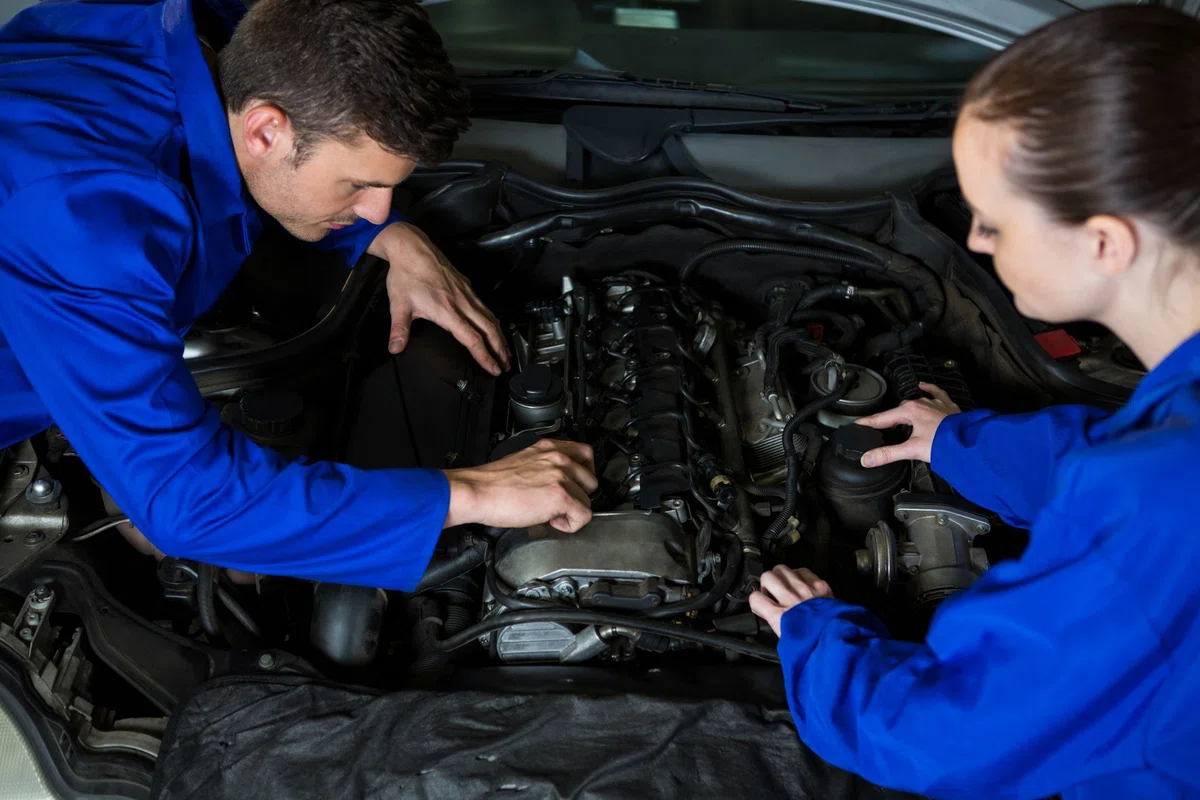
Car Cooling System Problems: Causes and Actions
Causes of failures in a car's cooling system can range from a failed radiator fan to a malfunctioning thermostat. This article discusses how to deal with problems and who to contact. Describes how to check the coolant level and how to start the engine. Typical causes of malfunctions related to contamination and clogging of the cooling system are also indicated. Get helpful tips and information about car cooling system problems.
Content
- How to proceed at the very beginning when a malfunction occurs
- How to reach the car service and whether it is allowed to start the car engine
- What are the typical causes of malfunctions in the vehicle cooling system
- Frequently Asked Questions
- How often should I check the coolant level?
- What to do if coolant leaks are detected?
- How do I know if the cooling fan is running?
- What might indicate a faulty thermostat?
- How to clean the radiator from contaminants?
- How often should the cooling system be serviced?
The causes of malfunctions in a vehicle's cooling system can be varied and are often very confusing. For example, a broken radiator fan blade, a stuck thermostat, or other malfunctions that require experience and specialized diagnostic equipment to detect and correct.
Let's take a look at how you can proceed and who you should contact if you have a problem with your engine cooling system.
How to proceed at the very beginning when a malfunction occurs
Before visiting a car service to diagnose the heating and cooling system of your car, it is recommended to check the presence of natural evaporation of coolant. In this case, open the hood and take a close look inside the expansion tank with antifreeze. Notice that there is a certain mark on this tank, labeled as "min" - it is to this point is not allowed to lower the level of coolant.
If the coolant level drops below the allowable mark, it is necessary to top up to the maximum value indicated on the expansion tank. The next day check the fluid level: if it has not decreased, the cause may be evaporation. If the fluid level has decreased, it is recommended to contact a car service center for diagnostics, as there is probably a leak.
There are several signs that indicate the presence of a leak in the system. One of them is a noticeable sugary-sweet odor coming from under the hood. You may also notice antifreeze stains on parts or on the ground, especially after long periods of parking. The occurrence of such signs requires immediate intervention and inspection of the cooling system. Be careful not to ignore these signals to avoid serious engine damage.
How can you determine the right choice of an auto repair shop?
If the antifreeze level is maintained within the normal range, it means that the problems with the car are most likely related to other components. In such a case, it is recommended to contact professionals at a car repair shop specializing in car repair.
It is not recommended to contact unqualified craftsmen who perform repair work unofficially in their garages. They usually work without a contract and can cause even more damage to your car. Moreover, you will not have any guarantees for their work, and as a result you will have to spend much more money on fixing the problem than it could be worth.
It is recommended that you go to an official service center that specializes in servicing your car brand. It is not difficult to find the nearest service center: they are usually marked with large signs that indicate the services provided. After the repair work is done, you will be provided with a receipt, warranty card and a certificate of completion.
You may also find it useful to visit Uslugi.ge website to search for car repair specialists in your city. On this resource you can familiarize yourself with customer reviews, ratings, contact information and prices for services.
By contacting specialists from Uslugi.ge, you do not risk that your car will have components replaced with old or used ones, as these craftsmen value their reputation and do not engage in illegal schemes.
How to reach the car service and whether it is allowed to start the car engine
According to the recommendations of all car manufacturers, you should definitely avoid starting a car with a faulty cooling system and even think about operating it. After all, this can lead to serious engine failure, and restoring its performance will require significant financial investments, reaching several tens, or even hundreds of thousands of rubles.
Nevertheless, there is some exception: if you find yourself in an emergency situation, you can try to drive a few kilometers on a car with a faulty cooling system. For example, imagine a situation when your car broke down in winter in severe freezing conditions. In such a case, while you are waiting for help, you run the risk of getting frostbite, especially if you are in a remote location with no quick evacuation option.
When your car is experiencing a cooling system malfunction, a tow truck can be called to help. The cost of the towing service depends on the class of your car, body type, location, and distance to your destination.
If you want to save money, you can ask a friend to take your car in tow and take it to the nearest car service center. In this case, you will most likely only have to reimburse your friend for the cost of gas, which is much cheaper than paying for a tow truck.
As an additional point of interest, it should be noted that some auto repair shops offer cooling system repair services at the site of the breakdown. This can be a convenient option, especially if the breakdown is minor and can be fixed quickly. However, keep in mind that these services are not always available in all areas.
Also, it is important to note that regular maintenance of your vehicle, including checking and servicing the cooling system, will help you avoid unexpected breakdowns and reduce the risks of serious problems. Therefore, it is recommended that you follow the maintenance schedule specified in your vehicle's owner's manual.
What are the typical causes of malfunctions in the vehicle cooling system
Your vehicle's cooling system can encounter a variety of problems that can cause malfunctions and damage. During use, salts, scale, and fouling build up in the cooling system, which can cause it to clog. When contamination reaches high levels, antifreeze becomes less efficient in circulation, which can lead to engine overheating or clogging of important cooling system components. In such cases, a hardware cooling system flush, which can be performed at an auto repair shop, can come to the rescue.
A problem with the thermostat can also occur in your car's cooling system. The thermostat is responsible for regulating the distribution of antifreeze in the system. Inside the thermostat is a valve that can sometimes get stuck in two positions:
- open
- closed
If the thermostat is stuck in the open position, it will take a long time for the engine to warm up to operating temperature, which can affect its efficiency. On the other hand, if the thermostat is stuck in the closed position, the engine may overheat and be damaged.
It is necessary to replace the thermostat with a new one in any case, regardless of the position it is stuck in.
Antifreeze leaks are another common problem in a car's cooling system. Antifreeze circulates through the many hoses and pipes of the cooling system and passes through the radiator, pump, thermostat, and engine. Any of these components can develop a leak, causing the fluid level to gradually decrease.
If you have an antifreeze leak, you should go to an auto service center where experts will diagnose and determine the cause of the leak. Depending on the detected problem, they can replace damaged pipes or hoses, as well as repair the radiator.
Another possible cause of problems in the cooling system could be a malfunctioning fan. The fan is located behind the radiator and is responsible for cooling the antifreeze that circulates in the system. If the fan is not functioning properly, the engine can overheat. Several factors can cause the fan to fail, such as a blown fuse, broken wiring, or a damaged bearing.
A broken pump can also be the source of a problem in your car's cooling system. The pump, or water pump, is responsible for pumping antifreeze throughout the cooling system. If the pump fails, the fluid stops circulating, which can cause the engine to overheat.
Unfortunately, restoring the cooling system pump is not possible in most cases, and it must be replaced with a new one. Contact a car service center for professional assistance and pump replacement.
Frequently Asked Questions
🚗 How often should I check the coolant level?
🔎 It is recommended to check the coolant level every few weeks or before long trips.
🚗 What should I do if coolant leaks are detected?
🔎 If leaks are detected, it is recommended that you contact an automotive mechanic immediately to diagnose and correct the problem.
🚗 How do I know if the cooling fan is running?
🔎 Start the engine and allow it to warm up. When the engine reaches a certain temperature, the fan should automatically turn on.
🚗 What might indicate a faulty thermostat?
🔎 Signs of a faulty thermostat may include the engine overheating or no heat in the cabin. It is recommended that you contact a professional for diagnosis and repair.
🚗 How do I clean the radiator of contaminants?
🔎 Use a soft brush or compressed air to remove dust, insects or other obstructions from the radiator surface.
🚗 How often should the cooling system be serviced?
🔎 It is recommended that the cooling system be serviced regularly every 1-2 years or as recommended by the vehicle manufacturer.







23 comments
Log in to leave a comment